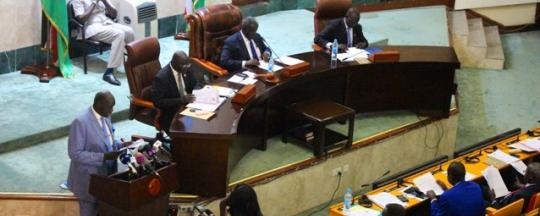An outspoken South Sudanese member of parliament says he has “no regrets” after boycotting a vote on a constitutional amendment to give more powers to President Salva Kiir, even though the boycott cost him his position as chairman of the parliament information committee.
Parliamentary leadership loyal to Kiir this week removed MP Thomas Wani Kundu and four other committee chairmen after boycotting the vote on the constitutional amendment.
The vote held on 19 November failed to secure the necessary 2/3 majority for passing constitutional amendments. According to a tally by the assembly speaker, there were no more than 189 member present.
Thomas Wani said in an interview on Wednesday that he has not regretted his decision even after his dismissal from his parliamentary position as the chairperson of the specialized committee responsible for information.
“I have no regrets, not at all. I was not representing myself in the assembly. I was elected by the people and the priority of the people who elected me and other members in the parliament is peace, security and the improvement of the economy,” he said when asked how he feels after being removed.
“The issue of the system of governance is not the first priority at this moment. It is a secondary issue,” he added.
Wani said he walked out with other members because they believe the creation of more states was not a competence of the national assembly but rather should be discussed in the Council of States.
Wani comes from Lainya County in Central Equatoria State and was one of the 37 members of parliament from the three states of the Greater Equatoria region who walked out from parliament in protest of the amendment of the constitution to give Salva Kiir powers to either increase or reduce the number of states in the country.
The legislator called for joint efforts to help the government to implement the peace agreement.
“Let us come together and work together as brothers and sisters. We must get to work together as South Sudanese regardless of our tribes or regions. The issue of tribes and region is what holding us at the issues from the national perspectives and it is the one creating division.”
He added, “Our first identity should be South Sudan and for this reason I call on all of us, young or old, politicians or members of the opposition, the civil society, the church and indeed you members of the media because media is like the mirror.”
“Let us work together to help our President Salva Kiir Mayardit and our government to implement the peace agreement. Together we need to serve this country with diligence and patriotism,” he added.




